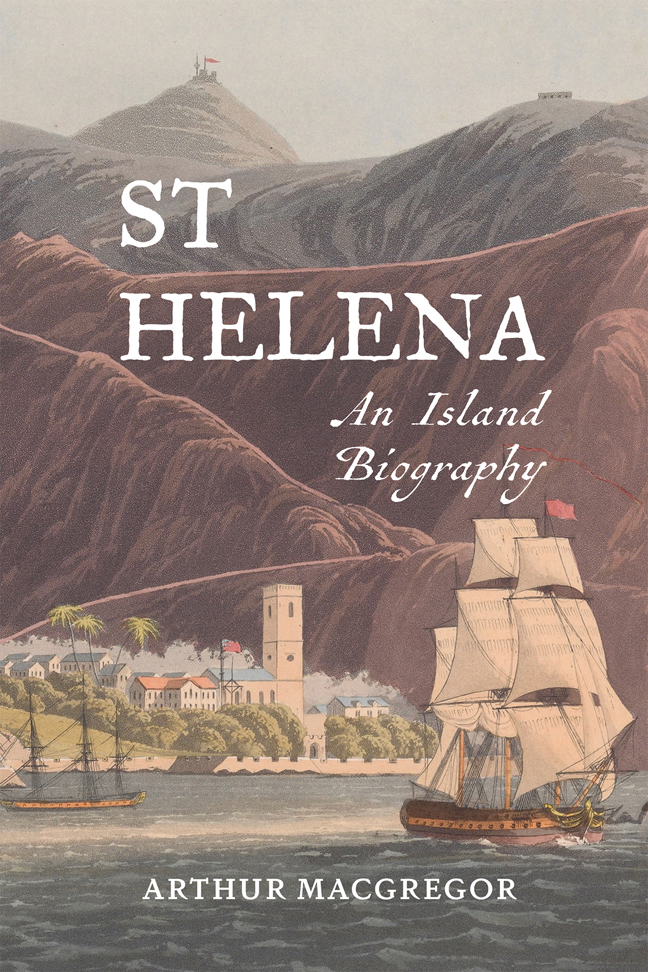Book contents
- Frontmatter
- Contents
- List of Illustrations
- Photo credits
- Preface
- Acknowledgements
- 1 Genesis
- 2 The breach: Europe and St Helena collide
- 3 Population and environment: early impacts
- 4 Population and environment: asserting control
- 5 ‘The citadel of the South Atlantic’
- 6 Scientists in transit: St Helena as a site for scientific investigation
- 7 Napoleon on St Helena
- 8 Later detainees, 1800s and 1900s
- 9 A place in the modern world
- Appendix: Governors of St Helena
- Bibliography
- Index
- Frontmatter
- Contents
- List of Illustrations
- Photo credits
- Preface
- Acknowledgements
- 1 Genesis
- 2 The breach: Europe and St Helena collide
- 3 Population and environment: early impacts
- 4 Population and environment: asserting control
- 5 ‘The citadel of the South Atlantic’
- 6 Scientists in transit: St Helena as a site for scientific investigation
- 7 Napoleon on St Helena
- 8 Later detainees, 1800s and 1900s
- 9 A place in the modern world
- Appendix: Governors of St Helena
- Bibliography
- Index
Summary
Admirable histories of St Helena have been compiled by a succession of extremely well-qualified authors over the past two centuries. In 1808, T. H. Brooke, sometime acting governor of the island, published his History of the Island of St Helena, from its discovery by the Portuguese to the year 1806 (a second edition of 1824 brought it up to the previous year): Brooke's work has provided a starting point for every author since that time. Alexander Beatson, again governor for a time, followed on with his Tracts relative to the Island of St Helena (1816), still frequently consulted – especially for its many recommendations for agricultural reform – and in 1875 John Charles Mellis's St Helena: a physical, historical, and topographical description of the island added a naturalist's perspective to the empirical surveys of the island's progress. At the more recent end of the spectrum, Philip Gosse's St Helena 1502–1938 (1938, reissued 1990) provided the ultimate chronological survey, up to the eve of our own period. Since that time the island has played a key role in a number of broader, context-setting surveys: in Richard Grove's Green Imperialism. Colonial Expansion, Tropical Island Edens and the Origins of Environmentalism, 1600–1860 (1995), St Helena features prominently in the development of a thesis that has given birth to an entire school of thought in economic geography and environmental history; Stephen Royle's The Company's Island. St Helena, Company Colonies and the Colonial Endeavour (2007) forms a masterly survey of the island's fortunes during what might be called its definitive period as an outpost of the East India Company; while in St Helena Britannica: Studies in South Atlantic Island History (2013) Alexander Hugo Schulenburg has brought together as editor a lifetime's work by the island's most recent resident historian, Trevor W. Hearl. The island is also host to a comprehensive website with information on almost every topic of historical or current interest: http://sainthelenaisland.info/islandinformation.htm. Alongside these key sources, papers in books and learned journals dedicated to a number of scientific disciplines have added depth and texture to the historical record, among which those of Q. C. B. Cronk on botany and Reginald A. Daly on geology stand out, while Wirebird, the journal of the Friends of St Helena, has evolved over fifty issues into an important platform for historical as well as current debate.
- Type
- Chapter
- Information
- St HelenaAn Island Biography, pp. xiii - xivPublisher: Boydell & BrewerPrint publication year: 2024

